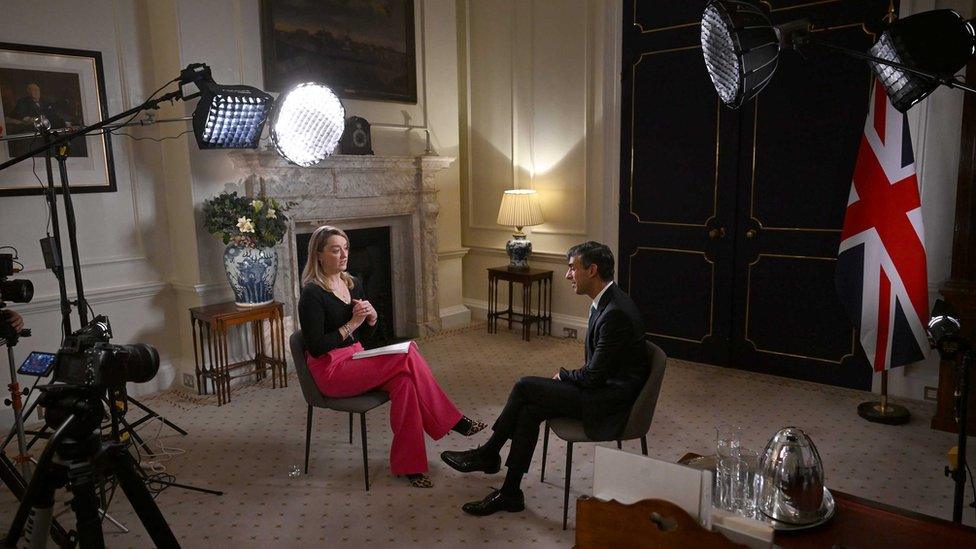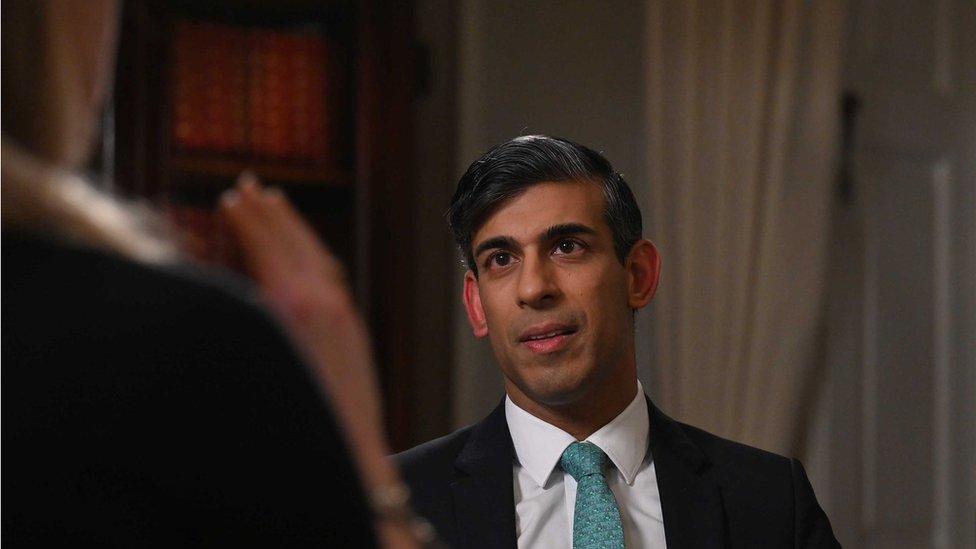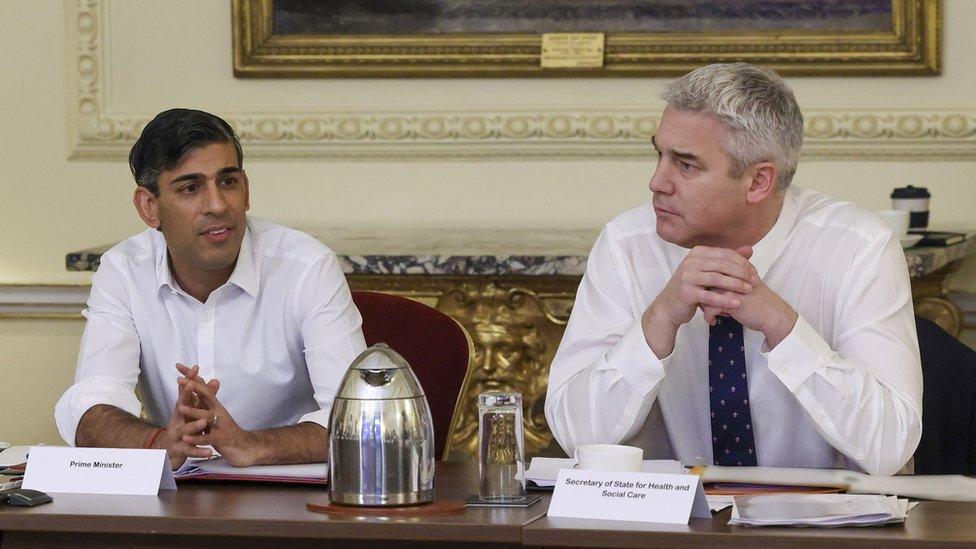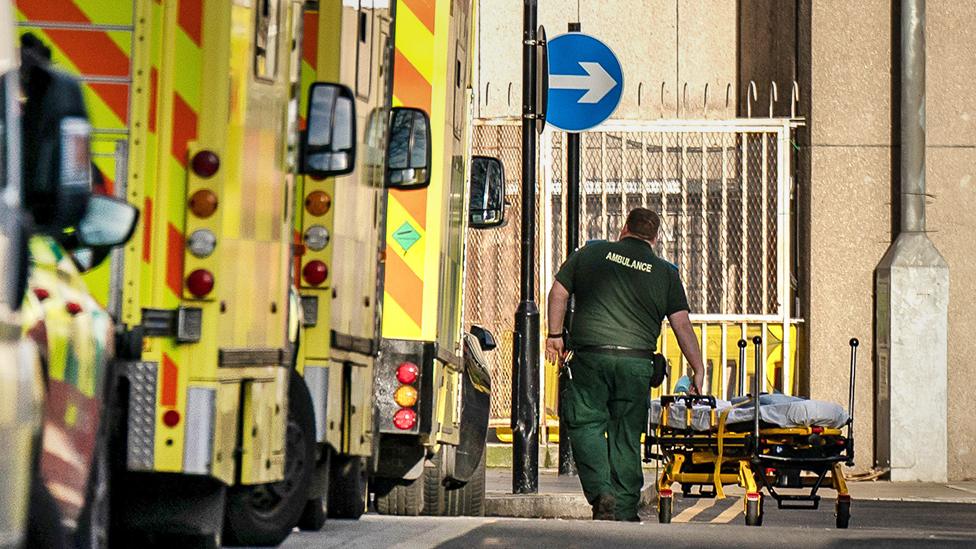NHS crisis: Rishi Sunak knows he will be judged on fixing its problems
- Published

With timing that Labour is gleefully pointing out, Prime Minister Rishi Sunak's promise to sort out the NHS came on the anniversary of a different vow from one of his predecessors.
The Conservative leader then was David Cameron who promised in 2010 that he would sort out the nation's finances, and "cut the deficit, not the NHS".
The promise came after a long stint of hard work by his tribe of Tory modernisers to "detoxify" the party's brand, to use the language of the day.
Absolutely core to that was to persuade the public to trust the Conservatives with the health service - which is never far from the top of the list of voters' concerns.
Fast-forward to the start of 2023 and the NHS is again high on the list of the public's concerns. It is creaking and struggling with the data nearly all pointing in the wrong direction.
Day after day stories emerge of delays and distress in emergency departments around the country, with doctors warning that people are dying unnecessarily because they just cannot treat them in time. Countless families around the country have their own horror stories.
The Conservative Party has been spending enormous amounts of taxpayers' cash on the NHS and Mr Sunak is keen to talk about the steps that he is trying to take, including Saturday's meeting of health leaders which he convened at No 10 to work out what could ease the strain.

Prime Minister Rishi Sunak first in-depth interview of the new year is on Sunday with Laura Kuenssberg
The programme will also hear from Labour's shadow health secretary Wes Streeting
Also on the show is Oscar-winning film director Sir Sam Mendes
Follow live updates, with analysis and reaction here on the BBC News website from 08:00
Watch live on BBC One and iPlayer from 09:00

But again, there is a pressure on him and his party to demonstrate to the public that they can translate the cash and pledges of commitment into a service that really provides for patients when they need it - that they can get the sick out of ambulances, into beds, and given the treatment they need.
Proving that though looks hard, very hard. That's not just because of the significant hangover from the pandemic, nor down to the serious outbreak of flu this winter.
But it is worth remembering that a high level of demand was one of the possible scenarios the NHS planned for.
There have been months of warnings from health leaders going into this winter, with one senior official saying "ministers cannot have been surprised".
More cash has gone in, but as our health correspondent Nick Triggle explains here, the huge cheques for health spending have not kept pace with demand or inflation.
The problems have been brewing for a long time: the Accident and Emergency target which says people should be seen within four hours has not been met since 2015.
Mr Sunak might want to fix the problems of today but their roots stretch back further than the pandemic. There are fewer beds and more staff shortages.
One of our viewers who got in touch with us won't be the only person in the country to be asking "how have they allowed this to happen?".

Second, there's perhaps a mismatch between the sense of the action the government wants to take now and the scale of the issues.
The government disputes the suggestion that at least 300 people are dying every week because of delays and overcrowding.
But it is indisputable that patients are suffering because of what is going on.
Ministers have promised 7,000 extra beds to help cope. But according to NHS sources only around 3,000 of them are available now, with some of them so-called "virtual beds" that help people to be treated at home.
That may well be a smart policy to help in the future but it is hard to see how it can relieve the significant pressure that is in plain sight right now.
Ministers also point to another £500m to deal with social care - but that was promised in the summer and only around half the cash has reached the front line.
There's another question right now that is being asked of Mr Sunak's government too.
Can the way the health service works really last into the next decade and beyond?
Scores of politicians would say privately that we need to have a conversation as a country about whether our way of providing health care can survive as medical advances create more amazing but expensive treatments and demand goes up and up as the population lives longer.
That is a conversation few politicians are willing to have in public - yet.
There was good reason why David Cameron wrapped himself in affection for the NHS. Even starting a conversation about how it works is politically deeply awkward for the Conservatives.
Whether or not a change to the fundamentals is required, one health leader told me this week it is imperative that we have that debate. But there simply is not much sign of it right now.
In his first TV interview of the year - his first full-length TV interview since he got the job - I asked the prime minister about whether he can get a grip on what is happening and if the NHS can go on as it is.
You can watch his response from 09:00 GMT on BBC One and iPlayer this Sunday.
Mr Sunak says he wants to be held to account about what happens, but knowing that even though there are no easy answers, he will be judged.
Related topics
- Published7 January 2023

- Published14 March 2024

- Published6 January 2023

